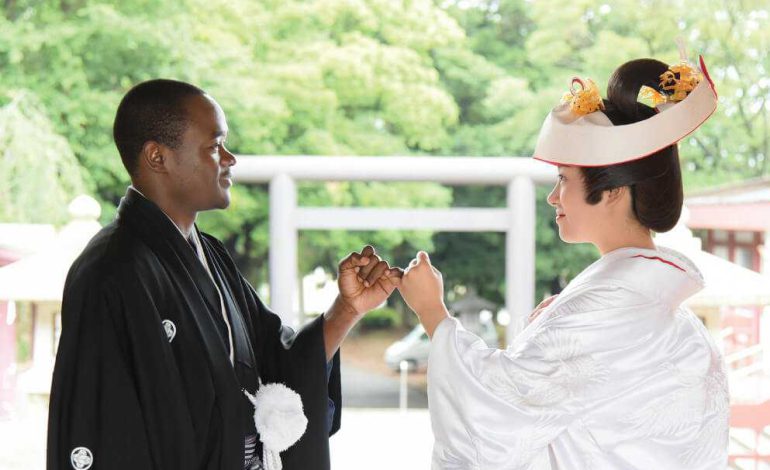KENYAN-JAPANESE LOVE BREWED IN SOUTH KOREA

It is said that love is a universal language and for Douglas and Aya Owino, truer words were never spoken. What started as a working relationship in South Korea blossomed into not only love, but also marriage and family. The couple, who relocated to Kenya last year, open up on their journey of romance, the intricacies of interracial love and establishing roots.
In 2015, Douglas Owino who had moved to South Korea after winning a post graduate scholarship for a Masters degree in international business management, met the love of his life albeit briefly.
“Aya and I met in July as interns at Daejeon International centre, an arm of the Daejeon Metropolitan city hall in South Korea. She was also a foreign student, from Japan. However, no sooner had I started my internship than hers ended. I didn’t get an opportunity to woo her,” says 27-year-old Douglas.
The love gods, however, must have pitied him because three months after Aya left, she was recalled to replace another intern who was leaving. This time round, Douglas did not miss a beat. He wooed her immediately and soon enough, they were an item. But there were challenges.
“Successful African/Asian relationships are uncommon in Asia due to cultural differences, language barriers and racism. Additionally, most Asian fathers have the last word on who their children marry. I knew if Aya’s father did not approve of our relationship, then we were in for difficult times with the possibility of Aya being excommunicated from her family. However, we had resolved to stick together come what may,” Douglas explains.
Aya further expounds, “All my mother said when I informed her I was dating an African man was that I should concentrate on my studies. Meanwhile, my father’s only response to the email I wrote to him explaining Douglas was the man I intended to marry was an emphatic ‘it is difficult to live in Africa!” chuckles the 25-year-old Korean language lecturer.
Despite her parents’ skepticism, Aya explained to them why she was dating Douglas and that just as she had adjusted as a foreign student in South Korea, she would do the same in Kenya. With that, her parents gave her the go ahead to formally introduce Douglas to the family in Japan in December 2015.
“I was nervous to meet the family but Aya assured me the fact that her parents had agreed to meet me meant that I was already in good stead with them,” says the businessman.
After 11 days in Japan, the couple got Aya’s family’s blessing and the two started making arrangements towards their traditional Japanese wedding. “While we had agreed to formalise our wedding in Kenya, we wanted to pay homage to Aya’s Japanese culture,” says Douglas.
Aya adds, “The ceremony takes place in a traditional Japanese religious shrine. The couple wears traditional regalia and just like in modern day weddings, the bride wears a white traditional gown (Kimono). I wore two gowns with the more vibrant coloured piece worn in honour of the legend of a beautiful Japanese princess. The couple then goes through a purification process (signified by washing of hands) and then a priest blesses them as they exchange their vows.”
The couple relocated to Kenya in March 2016. “Deciding where to live was difficult. We had an option of settling in South Korea, Japan or Kenya but I wanted to make a difference in my country,” Douglas shares.
Upon relocating to Kenya, employment was hard to come by. “There have been teaching prospects for Aya so we are waiting for word on where an opportunity matures. I on the other hand decided to use lessons from my scholarship experience to start a social enterprise geared towards helping students win full university scholarships in learning institutions overseas,” Douglas offers.
For the couple who formalised their union at the attorney General’s office in September 2016, the other challenge now is which traditional name to give Liam.
“The Japanese, just like Kenyans, take child-naming very seriously. That has made it difficult to settle on Liam’s traditional name. For now, he is Liam Barack and that works for us,” Douglas winds up the interview.
Photography/ Courtesy
Additional photos by Joe Mwangi
Published January 2017




